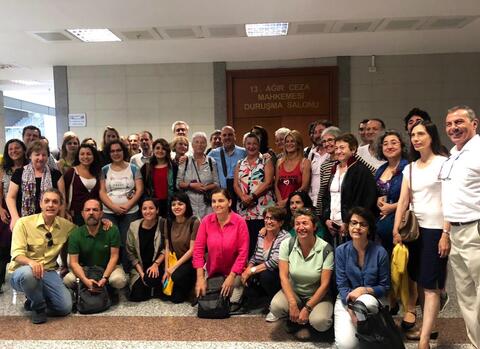
A journalist and an activist acquitted along with RSF's Erol Onderoglu of making 'terror propaganda' for PKK fighters.
An Istanbul court has acquitted the Turkey representative for Reporters Without Borders (RSF) and two other campaigners on charges of making "terror propaganda" for Kurdish fighters, according to the media freedom group.
RSF representative Erol Onderoglu was on trial with rights activist Sebnem Korur Fincanci and journalist Ahmet Nesin. Only Fincanci attended Wednesday's hearing, while Onderoglu and Nesin were abroad.
The accusation of making propaganda on behalf of the outlawed Kurdistan Workers' Party (PKK) came after the three guest-edited pro-Kurdish Turkish newspaper Ozgur Gundem in 2016. They risked 14 years in jail.
The newspaper was raided and permanently shut down in August 2016, accused of having links with the PKK which has waged attacks against the Turkish state since 1984.
The three campaigners were detained for a short period in 2016, and can now apply for financial compensation for time spent in jail.
The case triggered international alarm over press freedom, with activists claiming the climate for media had deteriorated under President Recep Tayyip Erdogan.
RSF said on Twitter it was "deeply relieved" by the acquittals, but called for another trial against Onderoglu, due to begin in November, to be scrapped.
The group's chief Christophe Deloire said on Twitter that the verdict was a "great victory for justice and press freedom, both of which are violated on a daily basis ... It represents a huge hope for all the journalists who remain arbitrarily detained."
Press freedom standing
Turkey ranks 157th out of 180 countries in the 2019 World Press Freedom Index of RSF. It held the same ranking last year.
The Turkish Union of Journalists says 135 members of news outlets are currently jailed in Turkey - the highest in the world.
The majority of mainstream media in Turkey has business ties to the government. This share significantly increased after the mainstream Dogan Media Group, the country's largest, was acquired last year by a group seen as pro-government.
Turkey's Western allies have accused the government of using a failed coup bid three years ago to silence opposition in the country.
Since the coup attempt, tens of thousands of people have been jailed pending trial and civil servants, military personnel and people in the private sector have been sacked or suspended from their jobs.
The Turkish government says that the purges and detentions are in line with the rule of law and aim to remove the supporters of Fethullah Gulen, a United States-based religious leader blamed for the 2016 coup bid, from state institutions and other parts of society. Gulen denies the claims.
Ankara says the security measures are necessary due to the gravity of the threat Turkey faces.